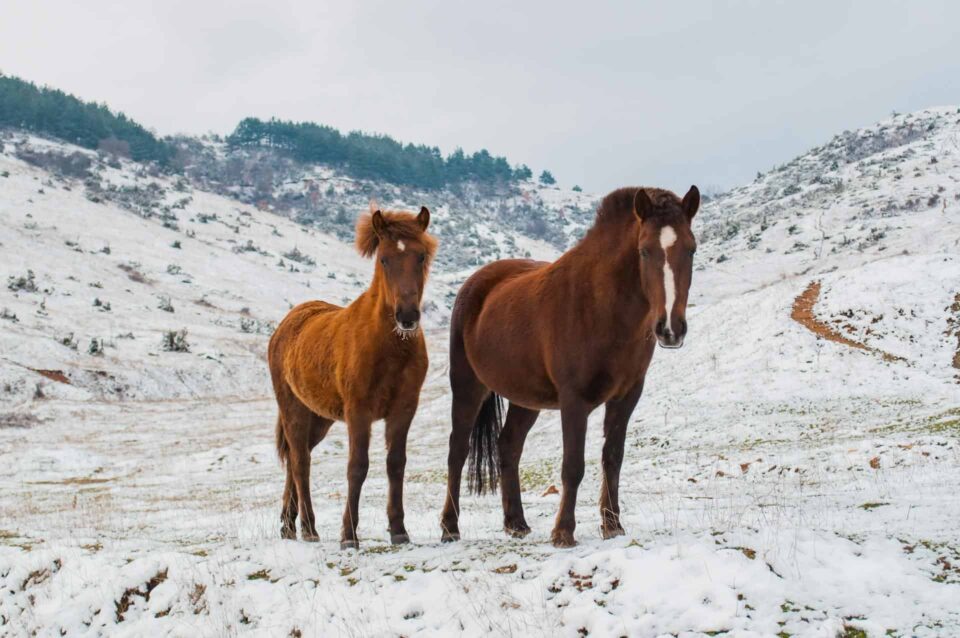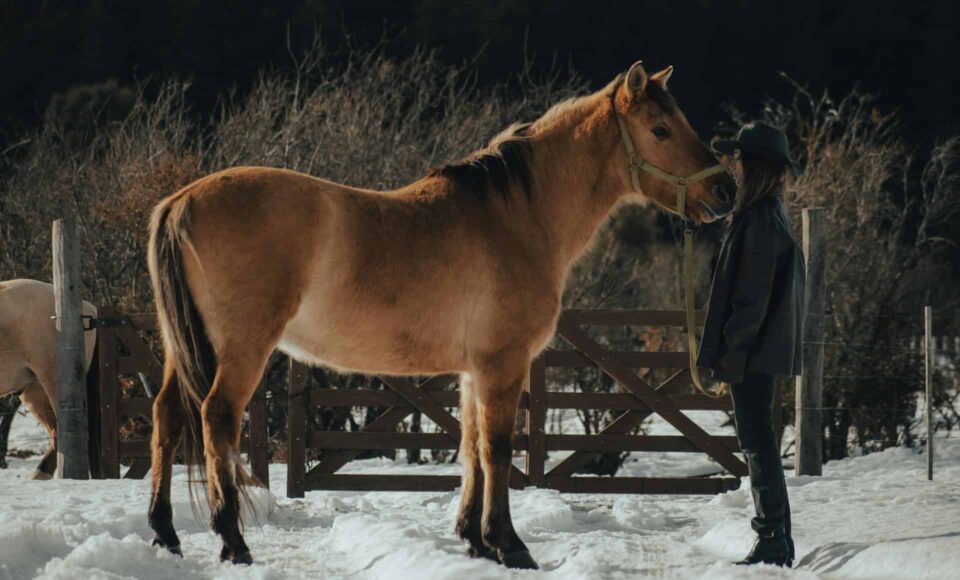Winter Horse Safety: 8 Problems to Keep an Eye Out For
Caring for horses during winter comes with its own set of hurdles. As the weather gets colder and the environment shifts, your horse may encounter several health and safety risks.
From staying warm to maintaining proper nutrition, being ready to tackle these seasonal challenges is essential. Let’s explore eight common winter problems and how to address them.
Key Takeaways
- Horses are vulnerable to cold-related issues like frostbite and weight loss.
- Proper hydration is essential during winter months to avoid dehydration.
- Regular hoof maintenance is important to prevent slipping and injuries.
- Watch for behavioral changes, as they can signal discomfort or health problems.
- Adjust feeding and shelter practices to match your horse’s winter needs.
1. Inadequate Shelter
Horses need protection from harsh winter conditions like wind, snow, and freezing rain. While they’re resilient, exposure to extreme weather can lead to frostbite, weight loss, or even illness. Providing a sturdy shelter, such as a run-in shed or stable, is crucial for keeping your horse comfortable.
Make sure the shelter is well-ventilated to reduce moisture buildup, which can cause respiratory issues. Adding a thick layer of bedding can also help your horse stay warm.
2. Dehydration
Dehydration is a common but overlooked problem during winter. Horses are less likely to drink cold water, which can lead to issues like colic or weight loss. It’s essential to ensure they have constant access to fresh, warm water.
Adding an insulated bucket or water heater can encourage drinking. Dehydration can also impact digestion, so pay close attention to your horse’s behavior. Tips for caring for your horse in winter can help prevent dehydration.
3. Poor Hoof Health
Winter conditions like ice, snow, and mud can take a toll on your horse’s hooves. Slipping on icy surfaces is a real concern, as it can lead to injuries. Regularly trimming hooves helps reduce the risk of cracks or buildup.
Hoof care is even more critical when icy conditions are present. Learn about trimming hooves to keep your horse steady and comfortable during winter.
4. Weight Loss
Horses burn more calories in winter to maintain their body temperature. If their diet isn’t adjusted, they may start to lose weight. Monitoring their body condition and adjusting feed accordingly is key to keeping them healthy.
Feeding hay provides energy and warmth, as its digestion generates body heat. You might also want to consult a vet about adding supplements to maintain their weight and overall health.

5. Joint Stiffness
Cold weather can exacerbate stiffness in horses, especially older ones. This is often linked to arthritis in horses, which can become more pronounced in winter. Providing warm, dry bedding and allowing regular movement can help reduce discomfort.
Stretching exercises or gentle walks can also help keep their joints flexible. Watch for signs of stiffness or difficulty moving, as these can signal worsening conditions.
6. Frostbite and Skin Conditions
Prolonged exposure to cold can lead to frostbite, particularly in a horse’s ears, nose, and lower legs. Horses with wet or damp skin are even more vulnerable. Keeping them dry and limiting their exposure to extreme cold is essential.
Regular grooming is another way to check for frostbite or irritation. Grooming tools and holistic products can help maintain their coat and skin health.
Related: Horse Grooming 101: Why is it Important?
7. Behavioral Changes
Winter can affect a horse’s behavior. If your horse seems restless, skittish, or lethargic, it could indicate discomfort. Cold weather and limited activity might also contribute to anxiety or boredom.
Products designed to calm horses can make a big difference. Gentle routines and consistent interaction can also help maintain their emotional well-being.
8. Digestive Issues
Winter diets, which are often heavier on hay, can lead to digestive issues like colic. Slow feeders and regular feeding schedules help manage this risk. Ensure your horse has access to clean, unfrozen water, as hydration is critical for digestion.
Learning to spot the signs of a horse in pain can help you address digestive problems early.

Tips for Preparing Your Horse for Winter
Winter brings unique challenges for horses, but with a few adjustments, you can keep your horse comfortable and healthy throughout the season.
- Adjust Feeding: Horses burn more calories in cold weather to maintain their body temperature. Increasing hay is essential since its digestion produces heat that helps keep your horse warm.
If needed, consult your vet about adding supplements for additional energy. Regularly monitor your horse’s body condition to ensure they’re maintaining a healthy weight.
- Check Shelter: A sturdy, draft-free shelter is crucial during winter. Inspect it for leaks, drafts, or other issues that might leave your horse exposed to harsh elements.
Adding deep bedding can also provide extra warmth and comfort. Make sure the shelter is large enough for movement but still cozy enough to retain heat.
- Monitor Behavior: Behavioral changes such as restlessness, lethargy, or anxiety can indicate discomfort or health issues. Address these signs promptly by making adjustments to their routine or consulting a professional.
- Maintain Hoof Care: Winter conditions like ice and mud can damage your horse’s hooves. Regular trimming helps prevent cracks or injury. Keep an eye out for snow or ice buildup that can make hooves slippery.
- Stay Hydrated: Horses often drink less in winter, increasing the risk of dehydration. Ensure they have constant access to clean, warm water, as frozen water can deter drinking. Using heated buckets or insulated waterers can help encourage hydration.
Protect your horse from winter challenges with Gou Gou Pets’ First Aid Ointment for Horses. It’s a great addition to your horse care routine, helping you address minor cuts, abrasions, and slow-to-heal wounds.
Conclusion
Winter brings unique challenges for horse owners, but staying proactive can make all the difference. By addressing issues like dehydration, frostbite, and joint stiffness early, you can keep your horse comfortable and healthy throughout the season. With the right care, you and your horse can enjoy a safe, happy winter.
~Veterinarian Recommended